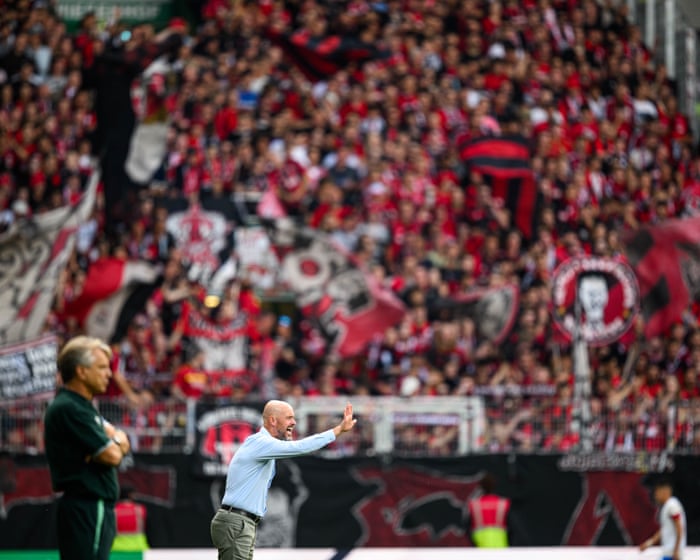Ronan Keating’s 1999 cover of “You Say It Best When You Say Nothing at All” might resonate with Erik ten Hag right now. Whether he’ll cope with his recent dismissal by watching Notting Hill with a tub of ice cream is anyone’s guess, but if he does, the film’s lyrics would surely hit differently.
Ten Hag didn’t need anyone to tell him that his second Bundesliga match in charge of Bayer Leverkusen was a disaster. Facing a weakened Werder Bremen—it’s too soon to call them “lowly,” though they may end up there—Leverkusen seemed in control, leading 3–1 with an extra player.
But then 18-year-old Karim Coulibaly, making his first senior start due to injuries, scored his debut goal from close range amid chaotic pressure. The equalizer sent the home crowd into raptures and sealed Ten Hag’s fate. Coulibaly’s surprise contribution felt like the final blow, though the truth is, Ten Hag’s dismissal had been brewing.
This marked a brutal and historic failure—no Bundesliga club had ever fired a coach after just two league games. Yet for those around Leverkusen before the Bremen match, it wasn’t a shock. Ten Hag was under immense pressure not only to get a result but to show signs of direction and leadership on the field.
None of that materialized. Even if Leverkusen had won, it would have been a hollow victory. Captain Robert Andrich called it “misery versus misery”—an entertaining but low-quality game where Leverkusen failed to impose their superior skill. Andrich, the only player to face the media afterward, was blunt as always.
“What happened sums up our situation,” he said. “Too many are focused on other things, too many only care about themselves. That’s how we played—everyone for themselves.” This was evident during a dispute over who should take a penalty, which Patrik Schick eventually scored to make it 3–1. Schick and Exequiel Palacios argued, Andrich intervened to give the ball to Schick (“We can’t stand around playing rock-paper-scissors”), and Palacios kicked the ball away in frustration.
If Andrich pointed fingers at the players, it also reflected poorly on Ten Hag’s authority. Ten Hag admitted after the match that the penalty-taker order was clear but not followed, calling it “unacceptable.” Yet while Ten Hag’s words fell flat, Andrich’s carried weight—just as his earlier criticisms had foreshadowed the departure of previous coach Gerardo Seoane and the arrival of Xabi Alonso.
Andrich’s message stood out because of its honesty, his delivery, and because he was the only one speaking up. Both sporting director Simon Rolfes before the game and the chief executive…Fernando Carro had chances to publicly support Erik ten Hag but chose not to. Their silence, as the saying goes, spoke volumes. Regardless of the result against Werder Bremen, it was hard to see anything reversing the situation.
If the performance in Bremen was poor, it was even worse the week before in the season opener against Hoffenheim. Still, that might be seen as a symptom rather than the root cause of ten Hag’s downfall. No one is claiming the former Manchester United manager had an easy start, given over €200 million in player sales this summer and the departure of key leaders like Lukas Hradecky, Jonathan Tah, and Granit Xhaka.
Even with ten Hag’s strong reputation in Germany from his time at Bayern Munich, he began at a disadvantage. Not only was he following Xabi Alonso and taking over a squad in transition at the end of an era, but he wasn’t the club’s first choice. Bayer Leverkusen initially believed they had a deal for Cesc Fàbregas to replace his former international teammate, but Como refused to budge, and Fàbregas wasn’t interested in pushing for a move.
From there, public relations missteps kept pace with player departures. There was the infamous 5-1 loss to Flamengo’s under-20s during a promotional tour in Brazil, intended to boost Leverkusen’s global brand. Ten Hag acknowledged the result shouldn’t have happened, but his comments that “the game came too soon” and that he “couldn’t care less about pre-season results” only fueled negative headlines.
Simon Rolfes, Leverkusen’s sporting director, did not publicly back ten Hag.
The situation worsened. Xhaka’s exit proved pivotal, not just because Leverkusen lost a key figure from the successful Alonso era, but because ten Hag—surprisingly to the club—publicly stated he didn’t want the Swiss midfielder to leave and intended to keep him. This blindsided Rolfes and Carro, as the sporting director had already framed the sale of an aging player from a previous regime for good money as “a win-win-win” and believed the strategy had been agreed upon with the coach privately.
Further issues arose: a new coaching staff that lacked cohesion, and a muted response to the Hoffenheim defeat, after which new signing Mark Flekken felt comfortable openly criticizing the team’s performance to journalists.
It will be a busy transfer deadline day for Leverkusen, with Eliesse Ben Seghir already arriving from Monaco and more high-profile players expected. These moves, along with the task of guiding the team back into the top four, will ultimately say more than any statement Rolfes or Carro could have made.| Pos | Team | P | GD | Pts |
|—–|———————|—|—–|—–|
| 1 | Bayern Munich | 2 | 7 | 6 |
| 2 | Eintracht Frankfurt | 2 | 5 | 6 |
| 3 | Cologne | 2 | 4 | 6 |
| 4 | Borussia Dortmund | 2 | 3 | 4 |
| 5 | St Pauli | 2 | 2 | 4 |
| 6 | Wolfsburg | 2 | 2 | 4 |
| 7 | Augsburg | 2 | 1 | 3 |
| 8 | Stuttgart | 2 | 0 | 3 |
| 9 | Hoffenheim | 2 | -1 | 3 |
| 10 | Union Berlin | 2 | -2 | 3 |
| 11 | RB Leipzig | 2 | -4 | 3 |
| 12 | Bayer Leverkusen | 2 | -1 | 1 |
| 13 | Mainz | 2 | -1 | 1 |
| 14 | Borussia M’gladbach | 2 | -1 | 1 |
| 15 | Hamburg | 2 | -2 | 1 |
| 16 | Werder Bremen | 2 | -3 | 1 |
| 17 | Heidenheim | 2 | -4 | 0 |
| 18 | Freiburg | 2 | -5 | 0 |
Frequently Asked Questions
Of course Here is a list of FAQs about Erik ten Hags dismissal from Bayer Leverkusen presented in a clear and natural tone
General Beginner Questions
Q Who is Erik ten Hag
A He is a Dutch football manager most famous for his successful time at Ajax Amsterdam He was recently the manager of Manchester United
Q Wait Im confused Was Erik ten Hag fired from Bayer Leverkusen or Manchester United
A This appears to be a mixup Erik ten Hag has never managed Bayer Leverkusen He was the manager of Manchester United The manager dismissed from Bayer Leverkusen was Xabi Alonso who left for a new job not due to poor performance
Q So what is the correct story here
A The correct story is that Xabi Alonso was the highly successful manager of Bayer Leverkusen who left the club at the end of the 202324 season There was no historically poor spell under him in fact he led them to an undefeated league title The mention of Erik ten Hag seems to be an error
Q What does dismissal marks a brutal conclusion mean in football
A Its a dramatic way of saying a manager was fired in a sudden and harsh manner often following a string of very bad results which brings their time at the club to an abrupt and negative end
Advanced Detailed Questions
Q If this was about a different manager what typically leads to a brutal conclusion like a dismissal
A Its usually a combination of factors consistently poor results the team performing well below expectations falling out with key players and a style of play that fans and the clubs board disapprove of
Q What does a historically poor spell refer to
A This phrase means the teams performance during that managers time was among the worst in the clubs entire history This could be measured by recordlow points in the league embarrassing losses or early exits from tournaments
Q What are the immediate consequences for a club after sacking a manager
A The club will immediately appoint a caretaker manager to lead the team while they search for a permanent replacement This period is often



